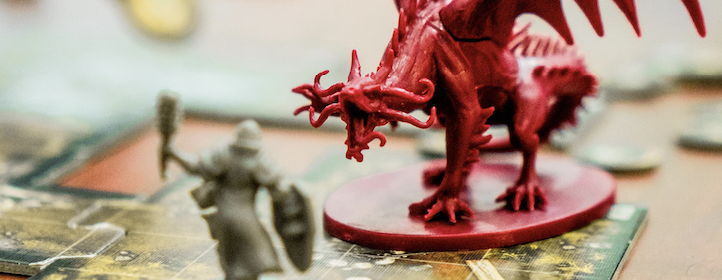D&D can go too far — with bad intent

Dungeons & Dragons. The role-playing game that captivates so many players. The game that is fused with imagination. The game where players spy on goblins hoarding mines and ask crusty old shopkeepers where they can find the treasure. The game that has caused so much conflict within the Christian community.
Ever since the creation of the game, Christians have raised issues with D&D and its morals, arguing against the witchcraft and dark spiritual forces that present themselves throughout the pages of the gameplay manuals. According to the Dungeons & Dragons website, the game is predominantly based on storytelling and players going on adventures together. The player known as the Dungeon Master is responsible for writing and controlling the story of the game. Since the game deals with topics like magic, wizards and demons, some Christians view the game as opening up to Satan’s domain.
When it comes to games that are open-ended and involve imagination, partaking in them does not mean that you believe in what is happening. In the same vein, reading a book from the “Harry Potter” series does not have to mean that a person believes in witchcraft; they might just enjoy the story and lessons in the books. A Christian can simultaneously enjoy a game like Dungeons & Dragons without believing in all the make-believe stuff that comes with it.
It is also up to the Dungeon Master what the story will be, and they can choose to leave out certain topics or include them less if they want to enjoy the game without those aspects. Fantasy also does not have to inherently corrupt one’s mind. C. S. Lewis, who has written many Christian books, also wrote “The Chronicles of Narnia” series, which has mythical beasts and witchcraft but also tells the story of Jesus’ sacrifice for us on the cross. The so-called sinful aspects like myths and magic only have power if you allow them to have power.
An article from Christ and Pop Culture discusses how games like Dungeons & Dragons can even — in a way — bring us closer to God. Jesus loved preaching through stories and parables; they are a big part of the way God connects with us. Stories broaden people’s minds and make us think differently than we would have otherwise, and storytelling is a major aspect of what Dungeons & Dragons is.
It is more of an idea than a generic board game, as everyone comes up with their own story and way of playing it. Dungeons & Dragons is not just one game, and it’s hard to call it simply “corrupt” if you do not know what every single game looks like. One person could make a very evil storyline, whereas another might come up with a story that is not evil at all.
Players of the game should just be selective of who they have as the Dungeon Master and not pick someone who they feel could lead them astray in any way. According to Geeks Under Grace, there have been accusations that players of the game have become involved with demons and witchcraft, but if that is not your intent and you are playing with other Christian players, then there should not be a moral issue. Objects themselves are not evil. How a person uses an object — or in this case, a storyline — determines potential corruption.
Dungeons & Dragons is having a resurgence of popularity and is more popular now than it ever has been, but everyone still seems concerned about whether it is morally acceptable or not. If you play it with the wrong intent, then it is certainly not moral. However, if you are playing with like-minded people and playing for fun without wrong intent, it’s perfectly all right to create your own story and play the game on your terms.
Carter is an opinion writer for the Liberty Champion

Thank you for this article! It was very interesting to hear how my own opinions and thoughts about these kinds of games matched up with this article. I don’t play Dungeons and Dragons, but I play a similar game (Magic: The Gathering) which does bring some dark forces into play, and even cards which are classified as “gods”, so it’s gotten me to think about the intentionality with which I play. I hope to see more of these articles so I can be more thoughtful of how I am spending my time and if it is honoring to the Lord